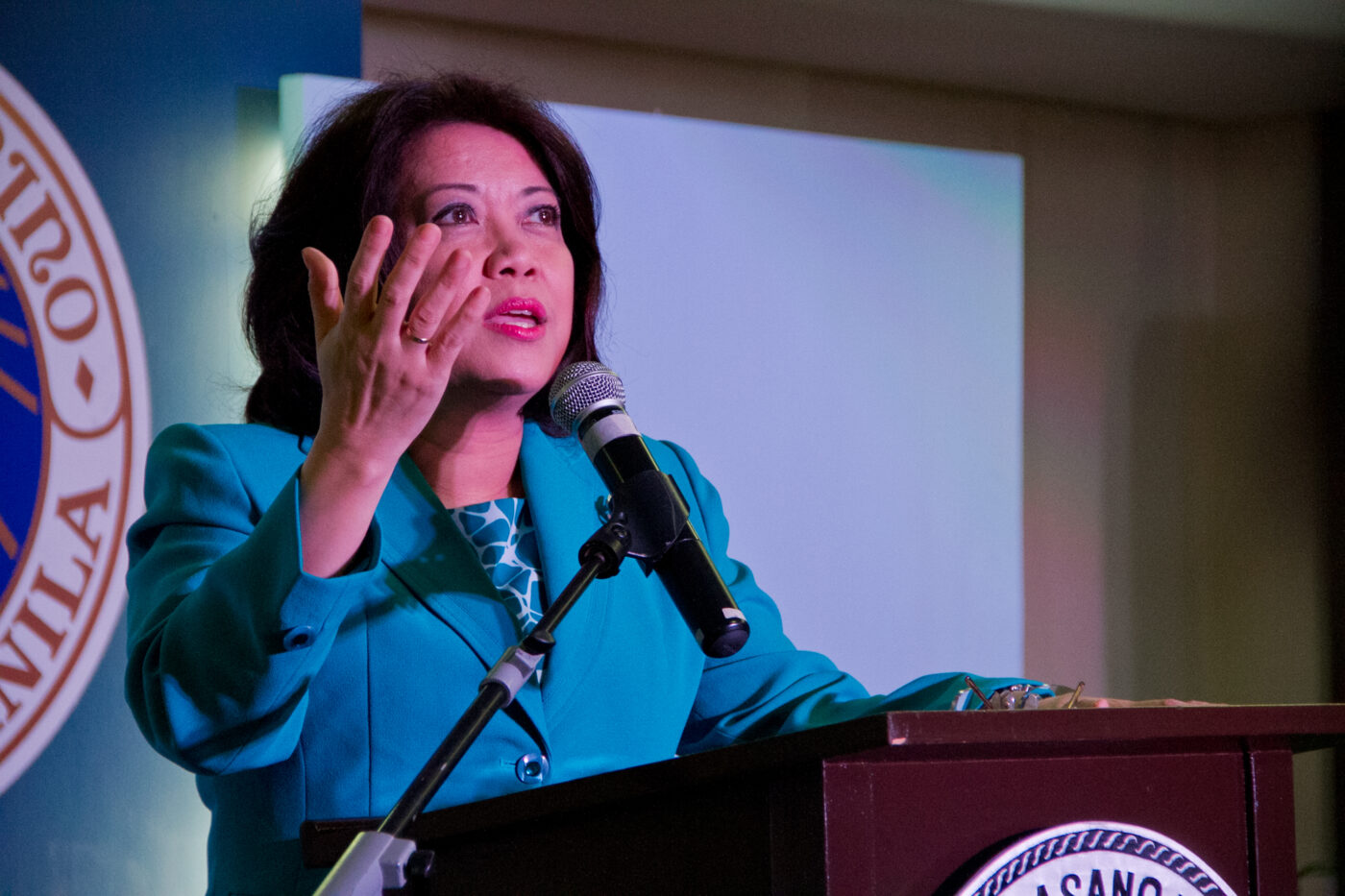THE ATENEO is celebrating 40 years of the university’s coeducation with a yearlong program of projects and activities aimed to inspire the Ateneo women.
Alumnae from different batches participated in the kick-off program for the coeducation anniversary last September 7 in the New Rizal Library.
The event, entitled “40 Years, Half the Sky: Celebrating Coeducation in the Ateneo,” acknowledged the “importance of women’s participation in the development of a free and peaceful society” within and outside the university.
Vice President for the Ateneo Professional Schools Antonette Palma-Angeles (AB Philo ‘77) said in her opening remarks that 2013 marks a milestone of achievements for the Ateneo women.
“[The] young women [enrolled in the Loyola Schools now make up] 51% of the student population. We have come a long way,” she said.
Palma-Angeles is one of the first female graduates of the Ateneo.
The event also featured an exhibition of coeducation memorabilia in the library. It was opened by Supreme Court Chief Justice Maria Lourdes Sereno (AB Eco ’80) after she delivered a short speech.
Women first entered the university as cross-enrollees in 1966. In 1973, the university accepted the first full batch of undergraduate female students into what was then the College of Arts and Sciences.
Transitioning to a coeducational system
In the 1960s, the issue of the Ateneo adapting a coeducational system sparked significant debate. Approval for the transition was declined twice prior to 1973.
In an interview with The GUIDON, former University President Bienvenido Nebres, SJ said that the failed transition to a coeducational system was due to the lack of assenting votes from the University Senate.
According to Nebres, who was then dean of the College of Arts and Sciences, the former University Senate was composed of “tenured professors” which included associate and full-time professors of the university.
Nebres mentioned that the concerns of the senate members did not stem from sexism but from the matter of practicality. Specifically, they were taking into consideration student quotas and available facilities on campus.
He further said that admitting female students would mean largely restructuring the university’s systems.
In 1973, Nebres himself presented the senate with another proposal for a coeducational system.
He emphasized that the transition would proceed in a step-by-step manner, with the quota for female freshmen first being limited to 100 students in the first year of coeducation.
In the same year, the University Senate accepted Nebres’ proposal.
Ateneo woman
During the commemorative program, Atenean alumnae from different generations described what made Ateneo women distinct.
Binky Dalupan-Palm (AB Socio-Anthropology ‘75), one of the first female transfer students, said the Atenean woman puts great value in education.
She elaborated that most of the first women who came into the Ateneo were primarily interested in the quality of education the university was offering.
Bubbles Bandojo (AB Lit ‘85) further characterized the Ateneo woman as “a discerning woman.”
“Para sa akin, ang Atenistang babae [ay] may dalawang marka: Una, marunong siyang mag-isip. ‘Yun ang pinagmamalaki ko sa natutunan ko sa Ateneo. [Pangalawa] may tapang siya [at] marunong kumilatis. (For me, the Atenean woman has two characteristics: First, she knows how to think. That’s what I am proud to have learned from the Ateneo. Second, she has courage and she knows how to discern),” Bandojo said.
Meggie Valdes (AB Comm ’09) also shared that the Ateneo has taught her to “dream big.” She said, “One of the things that I really value about my Ateneo education is that it pushed me to dream big not just for myself but also for my country.”
She also believes that Ateneo women seek challenges and look for ways to improve social situations.
“Generally speaking, the Ateneo woman is someone who is innovative, someone who looks to the future. She doesn’t let anything stop her,” Valdes said.
According to Sereno, the Atenean woman has a commitment to offer her life for others.
“Ang ating pagtugon ay… isang pangako na tuluyan nating itataya ang ating buhay para sa kapwa, sa ating mga mahal, sa ating bansa, sa mga nangagailangan ng ating tulong. (Our calling is a commitment to continuously offer our lives for others, our loved ones, our country and those who are in need of our help),” Sereno said.
A changed perspective
Several Ateneo alumni share the belief that coeducation has brought a new perspective to the university and its students.
According to Loyola Schools Vice President (LSVP) Rudy Ang, the university’s exclusivity in the past meant that the Ateneo only had “half of the talent [that was] out there.”
Ang said that the coeducational system has greatly increased the Ateneo’s contributions to society. He cited the accomplishments of Chief Justice Sereno, Filinvest CEO Josephine Gotianun Yap (BS Mgt ‘75) and ABS-CBN Head of Entertainment Production Cory Vidanes (AB Comm ‘83), among others.
He also said that “there are a lot of excellent women who can drive [the male students] to be the best that they can be.”
Ang added that the one of the great successes of coeducation is that the “women don’t feel any less of an Atenean than the men” as they no longer identify themselves as “coeds,” but rather as just Ateneans.
Former University President Nebres pointed out that the challenge for the Ateneo now is “to simply give the best education possible for everyone.”
Women for others
One of the highlights of the yearlong celebration of coeducation is a fundraising project that will grant scholarships to aspiring female Ateneans.
The scholarship drive is called “40 Coeds in our 4th Year” and it aims to raise money to send at least 40 scholars to school.
Filinvest CEO Yap, who is also co-chair of the scholarship organizing committee, said the scholarship program is “a way of giving back.”
“I think Ateneo education is really beyond just the general foundation of tools that you learn. It’s really the inspiration of magis. You try to give more,” she said.
“When we give scholarships to coeds we do not only affect and better their lives but maybe the generations after [as well],” she added.
Elly Reserva (IV BS/M AMF), an Office of Admission and Aid Scholar, expressed that education is essential to women empowerment.
“From what I experienced here in the Ateneo, women with strongest sense of hope are the scholars I’ve met,” Reserva said.
“It’s also important to give opportunities to underprivileged women because, for me, these underprivileged women have hope in them of wanting to be more,” she said.







